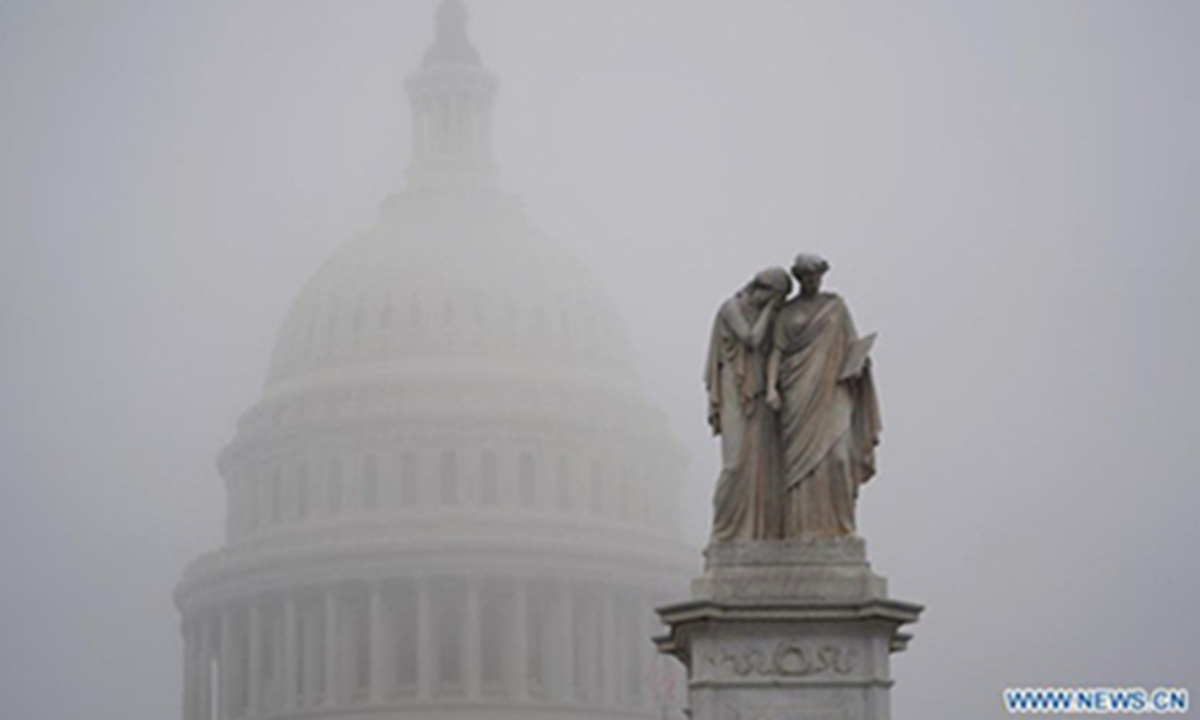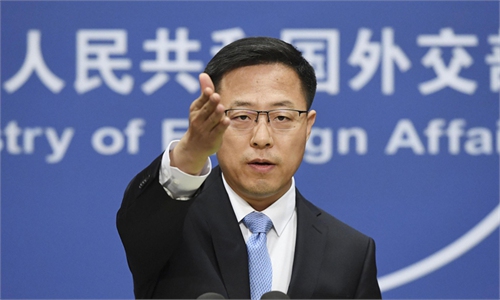
Photo: Xinhua
Editor's Note:
The global fight against the COVID-19 is still going on. But the US "lab-leak fiasco" has once again emerged as Biden and US bi-partisan sickening subterfuge. Why are the US politicians and media obsessed with such conspiracy? What has contributed to the stark contrast between China and the US in terms of handling the pandemic? Global Times (GT) reporter Wang Wenwen talked to Kenneth Hammond (Hammond), professor of East Asian and global history at New Mexico State University, over these issues. Hammond also works with the organization Pivot to Peace to push back against the aggressive words and actions of American politicians and media. He shared his views on the current China-US relations and the notion of the "community with shared future for mankind."
GT: The lab leak theory has been regarded as a conspiracy theory by US mainstream media in the past. But without any new evidence, it says this is the reason for the pandemic. Why is this?
Hammond: The new Biden administration has obviously decided that they're going to continue the policies and the posture of hostility toward China that was characteristic of the Trump administration; this really began back in 2011 with the Obama administration with what they call the pivot to Asia and repositioning of American defense policies or strategic policies toward containment of China. There was some hope when the Biden administration came in that they might move away from these confrontational policies. But clearly, that's not what's happening.
As the US is beginning to come out of this COVID-19 period, a lot of people are reflecting on the experience what we've gone through. There's one basic fact that people should be paying attention to, which is that China with 1.4 billion people had fewer than 5,000 deaths and controlled and contained this in 72 days, whereas the US, which has a much smaller population, has had almost 600,000 deaths, and it's gone on and on for almost a year and a half.
Why is there such a stark difference? Why has it been so terrible here when China was able to handle it so effectively? Obviously, the political leaders and the media don't want to answer that question. So instead of talking about that, they go back to this question of the origins. Because those are questions that probably can never be absolutely definitively answered in a way that satisfies every single possible question.
That's a way in which the American elites can deflect the responsibility that they hold for what happened here for all these deaths and deflect it away from themselves on to China, which has been their basic strategy.
GT: Some attributed the failure of the US handling of the pandemic to its systematic faults -namely democracy doesn't usually work in America anymore. What is your analysis?
Hammond: That's exactly right. I think that the contrast between the experience that China had and continues to have and the experience that we have had here in the US, most particularly, but in much of the West certainly in Europe as well, is based upon the fundamental differences in the social and political and economic systems of these societies. China has a system in which public health is considered a priority and a human right. In the United States and in the Western in general, health, medicine, medical science, medical technology, and drugs are commodities. These are things to be bought and sold in the market. The purpose of all that is to make profits for businesses.
We have a healthcare system that isn't designed to meet the needs of people; it is designed to make money for corporations, for businesses, for hospitals, for pharmaceutical companies, and for insurance companies. It's not geared up to mobilize the kind of social response that would have been necessary if we were going to try to contain and control the virus in the same way that China did.
So the contrast between the systems is stark. And again, that's why the leaders here don't want to talk about that. They don't want to talk about the successes of China. They only want to focus on how they can blame China for something.
I'm not sure if democracy is to be blamed. I think at the heart is the economic system. Now, what we have as a political system - we like to call it democracy - but it's democracy that is run by the same things. It's run by money, the corporations, and wealthy people that dominate the elections. We don't have a pure, true democracy.
GT: You once said that to manage China relations, the US should understand what is taking place in China and the wider world, and this may not be possible under existing capitalist social and political arrangements. What prompted you to say so? Do you expect any changes to the existing capitalist social and political arrangements?
Hammond: Not in the short term. We're in a very interesting period here in the US. Politically, a lot of people are questioning, despite all the media and all the blame game, why this has been so bad and the economic effects of the pandemic. More people are starting to question some of the fundamental principles and ways in which our society has functioned. This isn't just as a result of the pandemic.
Back in 2016, the previous presidential election Bernie Sanders first ran for the democratic nomination, and again, in 2020. I don't entirely agree with Senator Sanders on all issues, but he did something very important, which is that he brought the word "socialism" back into the American political vocabulary. Many young people, especially in America now, are interested in socialist thinking about solutions and they want to learn about it. We're in a period where there's a greater possibility for conversation, discussion, new and different ideas that haven't been acceptable in the US for a long time.
I don't think that we're going to have significant, profound changes in our system right away and in the next few years. But I do think the long-term trends are building in that direction, and I certainly hope so. Because one of the basic problems in the United States, especially in our relationship with China, is that people here don't know what China is like. They don't know what life is like there.
That's something that those of us who do have some knowledge of China try to do, which is to educate people and talk to people about what the truth is and what the realities are, because that's certainly not what they hear in the media and from the mouths of politicians.
GT: You do research of Chinese history and contemporary China. What is your understanding of the China-proposed, "community with shared future for mankind"? What are the different political philosophies behind it and the "America First" doctrine that is actually being practiced now by the Biden administration? What role will it play in post-pandemic country-to-country relations?
Hammond: That's exactly the vision of the future that I think should be shared by both Chinese and American people. Why not look at the world and think about how can we work together to improve things for everybody? Unfortunately, the people who hold power in America, the American political elite and the economic elite and the media put this other message out.
Their view is that China's rise, as they say, has to be a bad thing for America, and if China becomes more prosperous and plays a greater role in the world, that must mean the US is going to become less prosperous and lose its leadership. They have a very what we call a zero sum mentality. That's a very mistaken way to approach things.
The US has been the dominant power in the world for a long time. Some people, not most people, have become very secure in that. They fear a loss of that power and that dominance. They want to continue to run things, not just in America, but all over the world. They're anxious, and that's why they're so hostile and so aggressive toward China. They really want to try to stop the developments that are taking place in China. But that vision of a shared future, a sort of planetary community, seems to me just to be the natural trend of history.
When we look at the long, long centuries of modern history, it's better when the world is a community of different centers. The idea that there's only one center and we're going to hold on to everything and control it is not a good thing and has never been.
China is more influential, and it doesn't mean the US cannot continue to pursue its own path and course. Europe, as the European Union grows, is going to play a greater role. I personally, and the political people I work with, would like to see better world development. Why try to hang onto the past? Why not find a path in which Chinese people, American people and European people and those in Africa, India and Latin America all benefit through future development?

